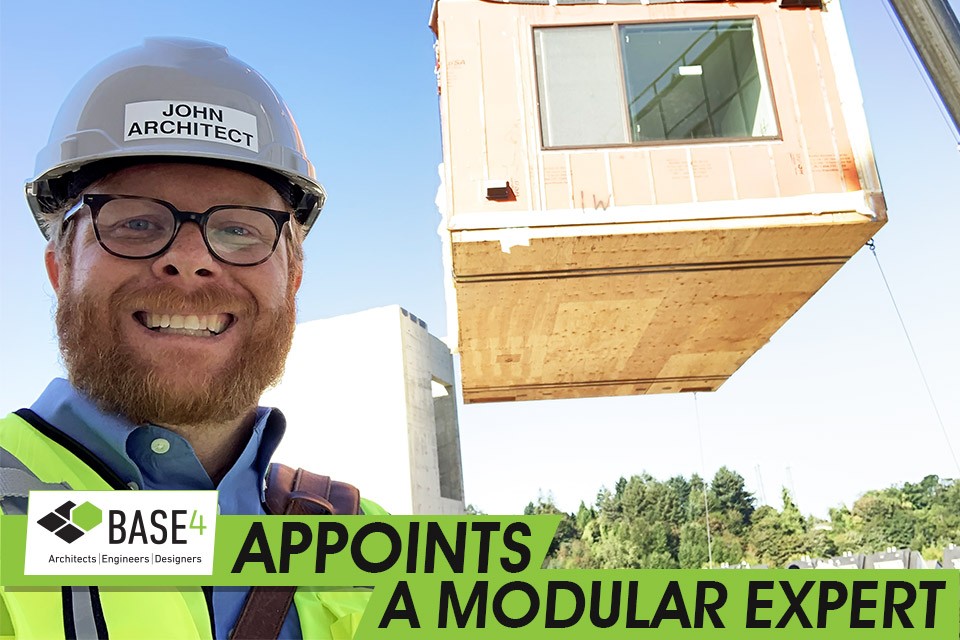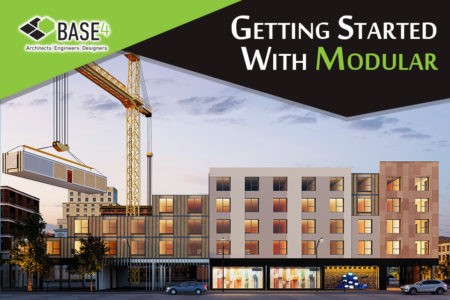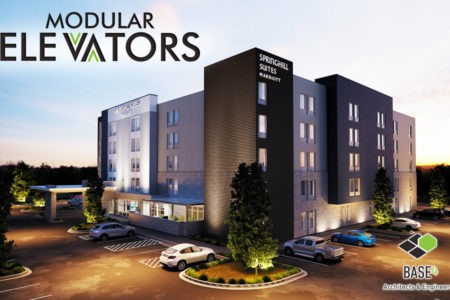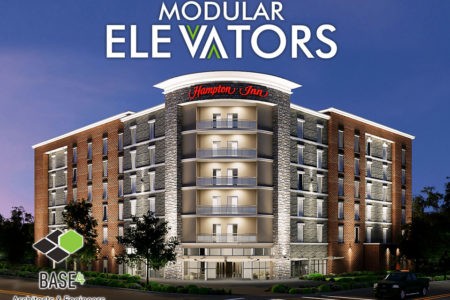BASE4 strengthens its modular expertise
As we strengthen our foothold in modular construction design at Modz4, we wanted yet another modular expert to join our awesome team.
After months of searching, all paths led to none other than John Morefield, who joins BASE4 as an architectural construction manager and multifamily modular expert.
Meet John Morefield
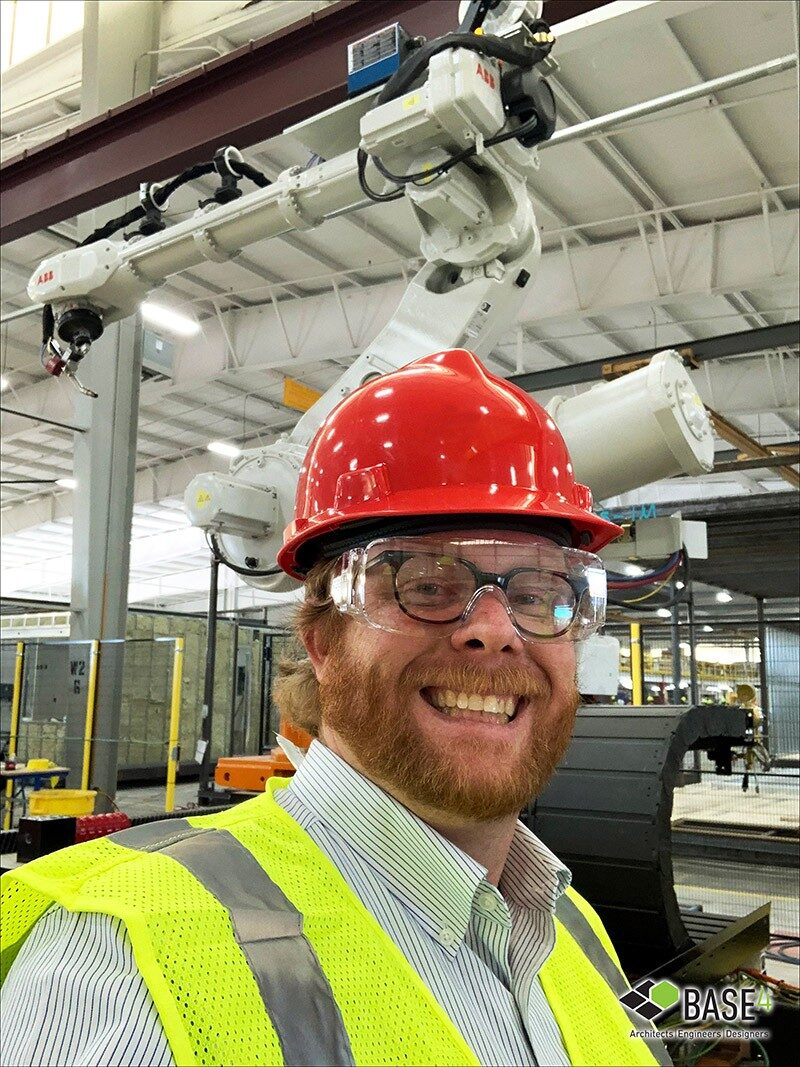
John Morefield has been leading the way with innovative design and delivery strategies. With over ten years of experience in multifamily design, John has worked with the City of Seattle to develop modular permitting and inspection standards. He is a member of both the Modular Building Institute and Seattle’s Design Review Board. John’s specialty is working with all partners in the modular ecosystem, right from financing and factories to municipalities and building inspectors—all to facilitate the “greener/faster/smarter” goals of modular design.
I am thrilled to have him on board! For you to understand what’s next in our chapter, here’s a Q&A with John. Give it a read!
Since when are you involved in modular construction, and how did you end up in this niche?
I have been working in the modular space now for a little over five years. I was lucky enough as a young associate to be given a project by my firm at the time with a forward-thinking developer who wanted to build a modular project in Seattle. It hadn’t been done before, there was one multifamily project in the city, but this one would be different. He asked if I was up for the challenge, and I dove right in. I quickly became aware that modular design was more than just designing boxes; it required coordination and communication with many different parties. You had to work with the factory to refine the design and talk with the city to discuss a different review and inspection process. It was all of the coordination and thought that intrigued me. To me, modular design brings the architect back into the role of a master builder. I think our profession has given away so much scope and responsibility, and this gives us a chance to design not only the building but the process.
What is your vision and hopes for the modular sector?
My goal with modular design is aligned with the Modular Building Institute—better, faster, greener. Architects have a great responsibility to aide in the climate crisis by adhering to the 2030 challenge and also by aiding the growing housing crisis. I believe modular and offsite construction can do both. The modular industry has been around for 30 years, but we are in a period of significant growth and innovation. It is an exciting time.
How is your community and policy engagement helping the modular movement?
One of the biggest hurdles to modular construction is the perceived risks and misconceptions from developers, contractors, and municipalities. Some of the questions I often get are: “is modular construction safe?”, “what building code do you use?”, “all of the inspections are done in the factory, right?”
People view modular construction as more than just an alternative construction delivery method. I have found that having a direct line of communication with a jurisdiction helps smooth the process and eliminates costly delays. If a building inspector doesn’t understand what they see on-site, they may slow down or even stop the process until all of their questions are answered. Modular has many benefits—a shortened construction timeline is one of them, but this advantage is fragile. It is up to the architect to protect these benefits though increased communication, planning, and public awareness. Hopefully, one day, what we are doing will be standard practice. But until then, I will be out there meeting with every jurisdiction as many times as it takes to ensure the project is a success.
At BASE4, what do you plan on accomplishing?
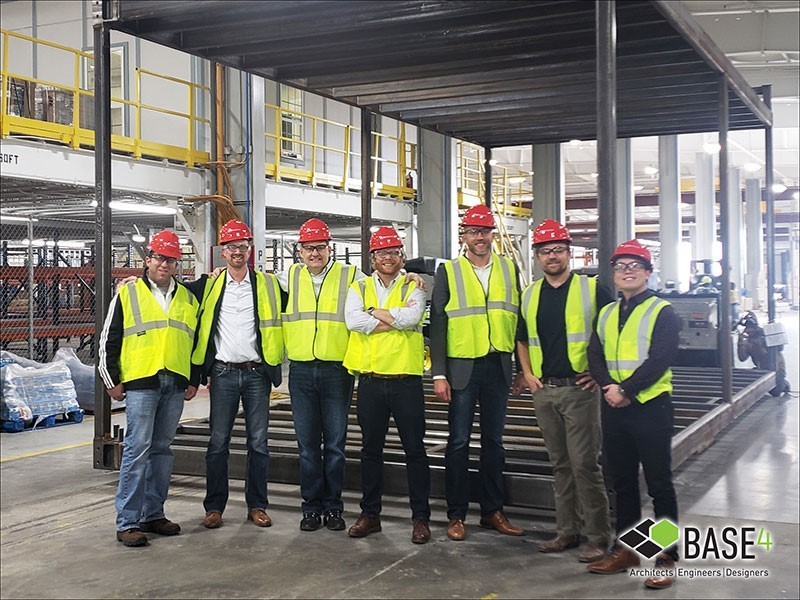 The BASE4 team at the Z Modular factory. (L to R) BASE4 CFO Adam Ginsberg; Director of Architecture Nate Loeffelholz; CEO Dr. Garry Vermaas; Architectural Construction Manager John Morefield; CMO Blair Hildahl; Senior Structural Engineer Peter Modica; and Director of MEP Engineering Hoang Le
The BASE4 team at the Z Modular factory. (L to R) BASE4 CFO Adam Ginsberg; Director of Architecture Nate Loeffelholz; CEO Dr. Garry Vermaas; Architectural Construction Manager John Morefield; CMO Blair Hildahl; Senior Structural Engineer Peter Modica; and Director of MEP Engineering Hoang Le
In September of this year, I set out to redefine what an architecture firm needs to be in the new space of modular and offsite construction. I wanted to build a firm that focused on providing value for my clients—one that was not based in the typical sense of a large firm slogging through drafting; I wanted to utilize technology in ways to aide and augment the process. As soon as I got set to build that ideal firm, Blair from BASE4 called—they had already created such a place and wanted to give my ideas rocket skates. I want to continue to build on the fantastic work and global efficiency of BASE4 to bring the architecture & engineering industry into the next decade and embrace the efficiencies the manufacturing industry has been developing.
Anything you’d like to share with our readers?
Modular design is the next big thing. I came to BASE4 because I found brave and courageous visionaries ready to embrace and craft the future. I’m excited to meet developers and builders equally as courageous, visionary, and prepared for the future. I am always available to talk, and I look forward to great discussions.
Modular construction, at its core, is geared toward sustainable outcomes. Factory production has been documented to produce less than 2% construction waste, and reduce construction carbon emissions by 43%. The factory environment also provides superior quality control and access for maintaining tighter air barriers and weather barriers, reducing onsite work, and improving the overall energy performance of the building.
John’s passion—paired with BASE4’s resources and vision—can put net-zero energy, multifamily buildings within affordable reach. Here’s to making modular construction more accessible!

Thank you,
Dr. Garry Vermaas
CEO, BASE4
garryv@base-4.com

